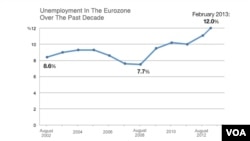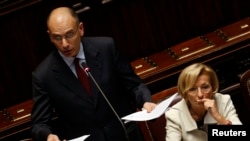The jobless rate in Europe's 17-nation euro currency bloc has hit another new high, edging up to 12.1 percent in March.
European officials said Tuesday that 19.2 million people are now unemployed in the eurozone, with another 62,000 workers laid off last month.
Analysts said the latest news about the eurozone labor market is likely to increase pressure on the European Central Bank to cut its benchmark interest rate when its policymakers meet later this week. The interest rate is already at a record low of three-quarters of one percent, but the bank could cut it by another quarter of a percentage point in an effort to boost the continent's stagnant economy.
Consumer prices across the eurozone advanced by 1.2 percent in the last year, the lowest level in more than three years and well below the central bank's target of keeping inflation just below the 2 percent mark.
With the eurozone economy stalled, numerous European leaders are calling for new policies aimed at advancing economic growth and easing austerity measures that have been adopted to cut government spending as a way to resolve the continent's three-year governmental debt crisis.
In Italy, where the jobless rate is 11.5 percent, new Prime Minister Enrico Letta said reducing unemployment is at the top of his agenda.
"The issue that will be at the top of my government's agenda is unemployment," he said. "Only with employment can we can emerge from the nightmare of impoverishment and head towards growth, overcoming social injustice by bringing wealth."
The jobless rate varied widely throughout the eurozone in March, with the rate holding steady at 5.4 percent in Germany, the currency union's most potent economy. But more than a quarter of the Greek and Spanish workforces are unemployed and the jobless ranks jumped in Cyprus to 14.2 percent after the island nation was forced to negotiate an international bailout.
The Cypriot parliament on Tuesday narrowly approved the rescue package, which includes confiscation of a large portion of the biggest bank accounts in the country.
European officials said Tuesday that 19.2 million people are now unemployed in the eurozone, with another 62,000 workers laid off last month.
Analysts said the latest news about the eurozone labor market is likely to increase pressure on the European Central Bank to cut its benchmark interest rate when its policymakers meet later this week. The interest rate is already at a record low of three-quarters of one percent, but the bank could cut it by another quarter of a percentage point in an effort to boost the continent's stagnant economy.
Consumer prices across the eurozone advanced by 1.2 percent in the last year, the lowest level in more than three years and well below the central bank's target of keeping inflation just below the 2 percent mark.
With the eurozone economy stalled, numerous European leaders are calling for new policies aimed at advancing economic growth and easing austerity measures that have been adopted to cut government spending as a way to resolve the continent's three-year governmental debt crisis.
In Italy, where the jobless rate is 11.5 percent, new Prime Minister Enrico Letta said reducing unemployment is at the top of his agenda.
"The issue that will be at the top of my government's agenda is unemployment," he said. "Only with employment can we can emerge from the nightmare of impoverishment and head towards growth, overcoming social injustice by bringing wealth."
The jobless rate varied widely throughout the eurozone in March, with the rate holding steady at 5.4 percent in Germany, the currency union's most potent economy. But more than a quarter of the Greek and Spanish workforces are unemployed and the jobless ranks jumped in Cyprus to 14.2 percent after the island nation was forced to negotiate an international bailout.
The Cypriot parliament on Tuesday narrowly approved the rescue package, which includes confiscation of a large portion of the biggest bank accounts in the country.







